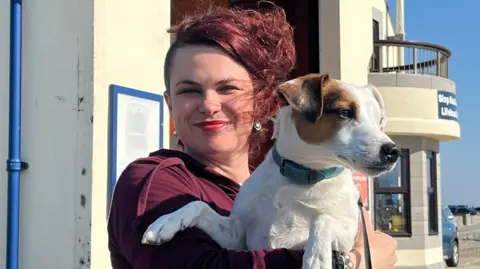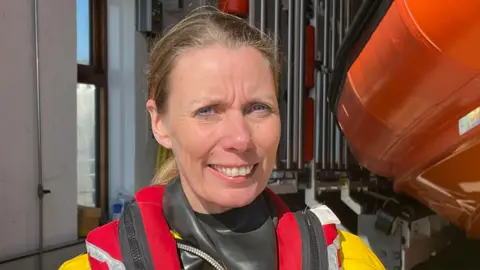All I could do was scream, says woman rescued by RNLI
 BBC
BBCWhen Emily Morus-Jones lay stranded after slipping on rocks along the north Wales coast, she feared the worse.
The tide was coming in, she knew there were rip currents in the fast-moving water, and she was stuck.
"I skidded on some seaweed hitting rocks and then fell awkwardly onto my knee. I felt immediate pain and all I could do was scream. I started worrying about how and if I'd be located," she said.
Ms Morus-Jones was one of the 53 lives saved by the RNLI in Wales in 2024 - almost 40% more than the 38 in the previous year.
It has been six months since Ms Morus-Jones was rescued but she has recalled the sense of relief and thanks when she saw the Beaumaris lifeboat coming into view as she lay on the beach on the Menai Strait area of Bangor, Gwynedd.
"I know the area well, when the tide comes in there's no beach and the water is very fast-moving with multiple rip currents," said Emily, a 38-year-old TV puppeteer from Anglesey.
"My initial thought was I could try and drag myself the way I came, but I tried to move and there was absolutely no way – it was just agony. I was also in shock, I knew then I was in a very serious situation."
"Thank god I had my phone and was able to call for help," she added.
'Busiest time of year'
The RNLI's lifeboats launched more than 9,100 times across the UK and Ireland in 2024, the fourth busiest year in the charity's 201-year history.
Those launches cost more than £190m, funded entirely on donations.
Ms Morus-Jones is now backing the charity's new Mayday Mile campaign this spring which will see fundraisers walk a mile each day throughout May.

"Usually we are heading out to respond to Mayday calls, but now we're the ones asking for help," said Gwen Beeken, a volunteer with the Beaumaris lifeboat.
"Thousands of people get into danger on and around the water each year and need our help, but everything we do is only possible thanks to the generosity of supporters."
The RNLI has 238 lifeboat stations around the UK and Ireland, as well as 240 lifeguard units on beaches, and has saved more than 146,000 lives since it was launched in 1824.
"It's clear from these new figures that demand for our services remains high, with our lifesavers dropping everything to run to the lifeboat station when the call comes," said Ms Beeken.
"We're now heading towards our busiest time of year, so we're putting out our call for help to raise the funds which will help keep our lifesaving service going."
